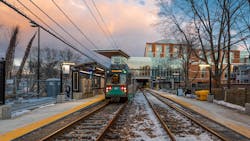MBTA plan reallocates $500 million to support critical capital investments
The Massachusetts Bay Transportation Authority (MBTA) Board’s Audit and Finance Subcommittee supported reallocating up to $500 million in operating funds to support critical and timely capital investments, allowing the MBTA to accelerate key capital projects in safety, advance key employee recruitment and retention initiatives, advance key investments in bus and more.
This one-time reallocation plan was presented to the full board at the Jan. 27 meeting. This funding is unrelated to the Bipartisan Infrastructure Law funds.
“Last fiscal year, we spent a record $1.9 billion in capital investments and addressed some of the state of good repair backlog. But we still have important investments to make,” said MBTA General Manager Steve Poftak. “This $500-million one-time transfer of funds will allow us to expedite crucial safety investments like the Green Line Train Protection Project, to continue supporting our workforce with pandemic pay for front-line employees, to further major investments that upgrade and modernize our bus system and more.”
During the COVID-19 pandemic, the MBTA received nearly $2 billion in one-time federal relief funds, which allowed the MBTA to maintain service levels and balance its operating budget despite significant reductions in fare revenues. Federal relief funds continue to be applied to eligible operating expenses, freeing up other revenues on a one-time basis.
With the support of the board, the MBTA plans to reallocate up to $500 million in operating funds to support critical one-time capital investments while still ensuring a balanced budget through FY23:
Safety Investments: $67 million will go toward accelerating key capital investments in safety, including $45 million in the Green Line Train Protection Project and accelerating the project’s schedule by a year to be completed next year instead of 2024; providing additional funds to support increased inspections at MBTA stations and facilities; and providing funds to address identified safety and non-code compliant concerns at the Lynn Parking Garage.
Workforce Investments: $20 million will go toward advancing key employee recruitment and retention initiatives, including supporting employee-focused initiatives like pandemic pay for front-line employees and the expansion of the human resources staffing program as well as establishing an employee recruitment and retention program with opportunities to extend hiring bonuses and referral bonuses for key positions at the MBTA.
Bus Investments: $109 million will go toward advancing key investments in bus, including funding for the Arborway Bus Facility (design), the Blue Hill Avenue Transit Priority Corridor and the North Cambridge Bus Facility, as well as additional funds needed to support the Quincy Bus Maintenance Facility and the procurement of 60 New Flyer buses as part of the New Flyer Bus Overhaul Project.
Shovel-ready Investments: $70 million will go toward advancing key shovel-ready and shovel-worthy projects, including advancing the Newton Commuter Rail Station project to 100 percent design, expanding the Codman Yard Expansion and Improvements project to include building and power infrastructure improvements and programing funds for potential near-term real estate opportunities and advance infrastructure planning for future electrification of the Commuter Rail network.
Additional Federal Formula Funding Preparation: $145 million will go toward preparing for additional federal formula funding. Funds identified provide the 20 percent match needed to program anticipated new federal formula funds as identified in the Bipartisan Infrastructure Law (BIL). New funds, including matching funds, will be programmed through the FY23-27 Capital Investment Plan development process.
Preserving the Existing Capital Program: $89 million will go toward preserving the existing capital program, including additional funds needed to support the Franklin Double Track and Signal and ATC Implementation projects, replenishing the surplus/contingency fund to support any future COVID-19 related (materials and labor) cost increases and advancing the full scope of the Tower 1 Interlocking Early Action project.
